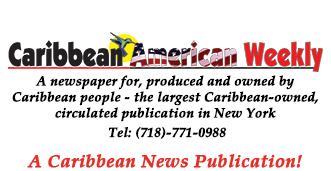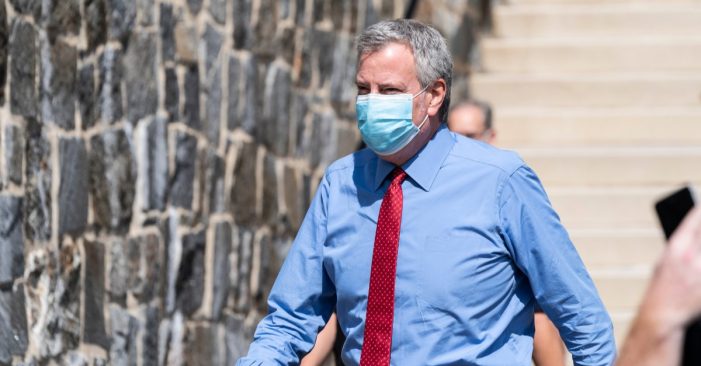Mayor de Blasio arrives for a press briefing at Bronx Collaborative High School – New York, NY – August 26, 2020 (Shutterstock)
NEW YORK—Mayor de Blasio today announced the launch of the Pandemic Response Lab (PRL), a facility dedicated to processing COVID-19 tests within 24-48 hours for NYC Health + Hospitals. Based in the Alexandria Center for Life Science in Manhattan, the lab is now up and running, and will scale up its capacity to process approximately 20,000 tests per day by November.
“With New York City’s infection rate and hospitalizations at their lowest point since the beginning of the pandemic, we know that our strategy of widespread testing and tracing is working,” said Mayor Bill de Blasio. “The PRL will build on our city’s reputation as a world leader in making testing available to everyone.”
In an effort led by New York City Economic Development Corporation (NYCEDC) and using technology licensed from NYU Langone Health based on research led by Dr. Jef Boeke, a geneticist and founding director of The Institute for Systems Genetics at NYU Langone, Brooklyn-based Opentrons, a robotics company focused on life sciences, worked with diagnostic experts from P4 Clinical, Health + Hospitals, and the NYC Test + Trace team to launch Pandemic Response Lab.
Through LifeSci NYC, a $500 million initiative announced by the Mayor in 2016, NYCEDC has done a significant amount of work to grow New York City’s life science ecosystem. Building upon this expertise, NYCEDC was called upon by the NYC Test & Trace Corps to support in the identification, operationalization, and coordination of a local lab for COVID-19 testing.
As the need for testing across the country rises, PRL will build on existing capacity as part of the overall NYC testing strategy and provide faster results dedicated to serve the City. The City has drastically improved turnaround times for COVID-19 tests, with over 80% of tests coming back within 72 hours or less, according to new metrics.
In addition to expanding the City’s lab capacity, PRL is providing New Yorkers with good-paying jobs – clinical lab technologists, customer success representatives, automation engineers, and scientists, among others – by already employing close to one hundred people. That number will climb to approximately 150 by November.
This past spring, NYCEDC and City Hall convened a Testing Innovation Council comprised of experts from academia from Columbia, Rockefeller, Memorial Sloan Kettering, CDC, and more. The Council evaluated diagnostic technologies to support NYC’s need for safe testing, including the scientific and operational vetting of options for lab capacity that led to the creation of Pandemic Response Lab.
“As New York City continues to re-open and the economic recovery begins, large-scale testing that provides results fast is key to keeping New Yorkers safe and the City moving forward,” said James Patchett, president, and CEO of the New York City Economic Development Corporation. “Throughout this pandemic, we have seen the extraordinary creativity and innovation of NYC businesses and institutions. Creating lab capacity right here is another example of this City’s ability to meet any challenge.”
At the peak of the COVID-19 pandemic, we committed to leveraging every possible opportunity to expand the City’s testing capacity as a part of our ongoing response,” said NYC Health + Hospitals Vice President of Clinical Operations Kenra Ford. “The Pandemic Response Lab allows us to increase the number of tests we can process daily, to decrease citywide turnaround times, and to immediately ensure expanded access to testing.”
“Slow lab results are holding back our city’s recovery. Pandemic Response Lab has been designed to help fix that,” said Opentrons CEO Jon Brennan-Badal. “We have paired experts in genetics and clinical diagnostics with cutting-edge automation and robotics that will allow us to deliver lab results to New Yorkers in 24 hours. Nothing is more important to us than helping our city respond to the pandemic. The pace of our recovery will depend on the speed and accuracy of citywide testing. We are proud to play a role in strengthening that infrastructure and in further democratizing a life science industry crucial to our future.”
“Testing is key to controlling the spread of COVID-19 and to guiding the revitalization of our city. Over the past 4 months, a team from Columbia, Memorial Sloan Kettering, and Rockefeller, has worked with the Mayor’s Office, the New York City Economic Development Corporation, and Health + Hospitals to build a powerful and inclusive testing strategy,” said W. Ian Lipkin, John Snow Professor of Epidemiology and Director, Center for Infection and Immunity, Columbia University Mailman School of Public Health. “If we all do our part, schools, businesses, restaurants, sports and entertainment can and will come back to NYC.”
“The Mayor’s Office, NYCEDC and NYC Health + Hospitals are providing just the right prescription for what New York City needs to deal with the ongoing COVID-19 pandemic—careful attention to data-driven decision making, through the work of the Testing Innovation Council and an extraordinary internal team,” said Robert B. Darnell, M.D., Ph.D. Heilbrunn Professor and Senior Physician, The Rockefeller University, Investigator, Howard Hughes Medical Institute and Founding Director & CEO Emeritus, NY Genome Center.
“The city and the NYCEDC had the right vision and initiative to assemble an accomplished team of experts from multiple institutions with hundreds of years of combined experience in order to expand testing for SARS-Cov-2 for the city. The urgency of developing a reliable, safe, affordable COVID-19 test with an actionable turnaround time was unprecedented. We believe these efforts will aid in improving the lives of those living or working in the city and expedite the recovery of the NYC economy,” said Orly Ardon, PhD, MBA, Digital Pathology Scientific Manager at Memorial Sloan Kettering Cancer Center and member of the Testing Innovation Council.
“Increasing New York City’s COVID-19 testing capacity to enable faster, more easily accessible, scalable and effective testing is critical to curtailing the spread of COVID-19 as well as facilitating a safer reopening of workplaces, schools, communities, and society overall,” said John Cunningham, executive vice president and regional market director of New York City at Alexandria Real Estate Equities, Inc. “We are proud that our leadership position in New York City’s life science ecosystem has provided us the opportunity to work closely with the City of New York and the NYCEDC to bring Opentrons and its Pandemic Response Lab to the Alexandria Center. This represents an important step in preparing for potential resurgences this fall.”
“Testing is key as our city continues to reopen and beat back the virus. The Pandemic Response Lab at the Alexandria is a major step forward towards expanding testing capacity,” said Council Member Keith Powers. “Thank you to the team at the Alexandria and EDC for their work to expand testing for New Yorkers.”
“As our businesses and offices continue to reopen and schools begin to welcome back students for learning, accessible COVID-19 testing that provides fast and reliable results will be essential to stop the spread of this disease and usher in a successful economic recovery in New York City,” said Council Member Paul Vallone, Chair of the Committee on Economic Development. “The Pandemic Response Lab is a true testament to our city’s adaptability and ingenuity, and I thank NYCEDC for leading the charge on this important effort.”
“Manhattan Community Board Six welcomes the Pandemic Response Lab (PRL) at the Alexandria Center for Life Science to our district. The increased capacity that the PRL will provide will improve our city’s ability to keep COVID-19 transmission rates low by enabling our Health + Hospitals locations to offer New Yorkers speedier test results, all while bringing 150 new jobs to Manhattan Community District 6,” said Molly Hollister, Chair of Manhattan Community Board Six. “During these challenging times, any initiative that supports both our public health and our local economy is a win-win for our district and for all of New York City.”

